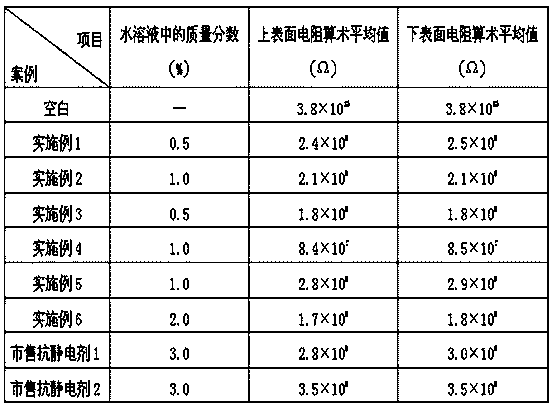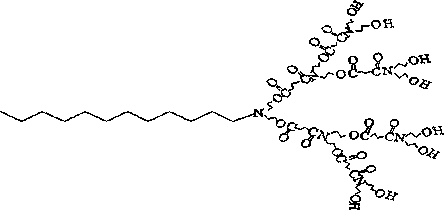Application of Hyperbranched Polymer in Antistatic Agent for Flame Retardant Conveyor Belt
A technology of hyperbranched polymer and antistatic agent, used in polyester coatings, coatings, etc., can solve the problems of reducing the thermal stability of conveyor belt surface materials, unsatisfactory antistatic effect, poor heat resistance, etc., to prevent static electricity. The accumulation of charge, efficient conduction and leakage, and the effect of enhanced hydrophilicity
- Summary
- Abstract
- Description
- Claims
- Application Information
AI Technical Summary
Problems solved by technology
Method used
Image
Examples
Embodiment 1
[0046] (1) Weigh 12.799g of chlorododecane into a three-necked flask equipped with a magnetic stirrer and a reflux condenser, add 7.749g of ethanol, stir and heat up to 70 degrees Celsius; dropwise add 6.571g of diethanolamine into the three-necked flask, Stir for 0.5 hour, then add 2.501 g of NaOH, heat up until reflux occurs, and keep the reaction for 4 hours. Purify the crude product and distill it under reduced pressure to obtain N,N-dihydroxyethyl dodecylamine;
[0047] (2) Weigh 10.007g of succinic anhydride and 10.514g of diethanolamine, first dissolve the diethanolamine in 30mL of DMAc, dissolve it and pour it into a three-necked flask with a magnetic stirrer; then dissolve the succinic anhydride in 40mL of DMAc and pour it into Constant pressure dropping funnel, then slowly drop it into the three-necked flask, stir while adding dropwise, add dropwise for about one hour, and react at room temperature for 3 hours to get AB 2 type monomer;
[0048] (3) Weigh 4.558g of ...
Embodiment 2
[0052] (1) Weigh 12.799g of chlorododecane into a three-necked flask equipped with a magnetic stirrer and a reflux condenser, add 7.749g of ethanol, stir and heat up to 70 degrees Celsius; dropwise add 6.571g of diethanolamine into the three-necked flask, Stir for 0.5 hour, then add 2.501 g of NaOH, heat up until reflux occurs, and keep the reaction for 4 hours. Purify the crude product and distill it under reduced pressure to obtain N,N-Dihydroxyethyl dodecylamine.
[0053] (2) Weigh 10.007g of succinic anhydride and 10.514g of diethanolamine, first dissolve the diethanolamine in 30mL of DMAc, dissolve it and pour it into a three-necked flask with a magnetic stirrer; then dissolve the succinic anhydride in 40mL of DMAc and pour it into Constant pressure dropping funnel, then slowly drop it into the three-necked flask, stir while adding dropwise, add dropwise for about one hour, and react at room temperature for 3 hours to get AB 2 type monomer.
[0054] (3) Weigh 4.558g of ...
Embodiment 3
[0058] (1) Weigh 12.799g of chlorododecane into a three-necked flask equipped with a magnetic stirrer and a reflux condenser, add 7.749g of ethanol, stir and heat up to 70 degrees Celsius; dropwise add 6.571g of diethanolamine into the three-necked flask, Stir for 0.5 hour, then add 2.501 g of NaOH, heat up until reflux occurs, and keep the reaction for 4 hours. Purify the crude product and distill it under reduced pressure to obtain N,N-Dihydroxyethyl dodecylamine.
[0059] (2) Weigh 10.007g of succinic anhydride and 10.514g of diethanolamine, first dissolve the diethanolamine in 30mL of DMAc, dissolve it and pour it into a three-necked flask with a magnetic stirrer; then dissolve the succinic anhydride in 40mL of DMAc and pour it into Constant pressure dropping funnel, then slowly drop it into the three-necked flask, stir while adding dropwise, add dropwise for about one hour, and react at room temperature for 3 hours to get AB 2 type monomer.
[0060] (3) Weigh 1.953g of ...
PUM
 Login to View More
Login to View More Abstract
Description
Claims
Application Information
 Login to View More
Login to View More - R&D
- Intellectual Property
- Life Sciences
- Materials
- Tech Scout
- Unparalleled Data Quality
- Higher Quality Content
- 60% Fewer Hallucinations
Browse by: Latest US Patents, China's latest patents, Technical Efficacy Thesaurus, Application Domain, Technology Topic, Popular Technical Reports.
© 2025 PatSnap. All rights reserved.Legal|Privacy policy|Modern Slavery Act Transparency Statement|Sitemap|About US| Contact US: help@patsnap.com



